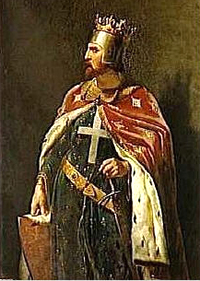King Richard 1st (Lionheart) - Part 3
The emperor demanded that a King's ransom of 150,000 marks be delivered to him before he would be prepared to release Richard. This amounted to two or three times the annual income for the English Crown. Somehow, back in England, the new Chief Justiciar Hubert Walter along with Richard's mother Eleanor of Aquitaine managed to raise this massive sum of money. In order to do this, Clergy and laymen were taxed for a quarter of the value of their property and the gold and silver treasures of the churches were confiscated. At the same time, John, Richard's scheming brother in cohorts with King Philip of France offered 80,000 marks for the Emperor to hold Richard prisoner until Michaelmas 1194 but the Emperor turned down the offer. The money was eventually paid over and finally, on 4 February 1194 Richard was released. Philip sent a message to John: "Look to yourself; the devil is loose".
 Back in England, Richard the Lionheart was crowned for a second time by Hubert Walter who was now Archbishop of Canterbury, at Winchester on the 17th of April 1194. Richard found it within himself to forgive his brother John for his part in the plot against him and after only a couple of months in England which were to be his last visit, he returned to France to seek revenge against Philip and to fight for the return of territories which he had lost there. Right: 19th century portrait of Richard
Back in England, Richard the Lionheart was crowned for a second time by Hubert Walter who was now Archbishop of Canterbury, at Winchester on the 17th of April 1194. Richard found it within himself to forgive his brother John for his part in the plot against him and after only a couple of months in England which were to be his last visit, he returned to France to seek revenge against Philip and to fight for the return of territories which he had lost there. Right: 19th century portrait of Richard
Richard poured all his military expertise and vast resources into war on the French King. He constructed an alliance against Philip, including Baldwin IX of Flanders, Renaud, Count of Boulogne, and his father-in-law King Sancho VI of Navarre, who raided Philip's lands from the south. He also managed to secure the Welf inheritance in Saxony for his nephew, Henry the Lion's son Otto of Poitou, who was elected Otto IV of Germany in 1198. Largely as a result of these and other political intrigues, Richard won several victories over Philip. At Freteval in 1194, just after Richard's return from captivity and money-raising in England to France, Philip fled, leaving his entire archive of financial audits and documents to be captured by Richard. At the battle of Gisors (sometimes called Courcelles) In 1198 Richard took "Dieu et mon Droit"—"God and my Right"—as his motto (still used by the British monarchy today), echoing his earlier boast to the Emperor Henry that his rank would acknowledge no superior except God. - King Richard I Part 4 - King Richard I Pt. 2


